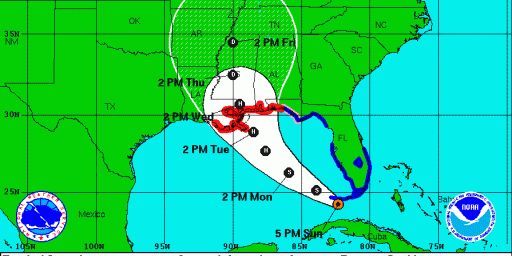Katrina: Are the Poor Better Off After Hurricane?
Former First Lady Barbara Bush, one of the most admired and beloved figures in recent American history, generated a huge controversy Monday when she said that the poor of New Orleans are actually better off after Hurricane Katrina.
Chicago Tribune columnist John Kass provides one of the more measured rebukes:
Mother’s remark puts silver foot in Bush’s mouth
I was all set to defend President Bush as a guy who really doesn’t want poor black people in Louisiana and Mississippi to die of starvation and disease, no matter what the Democrats say. But then Barbara Bush, the president’s mom, went and dusted off the Bush family silver foot Monday. And she used it.
While touring the Houston Astrodome, where thousands of Hurricane Katrina refugees have been huddling, Barbara Bush said they didn’t have it so bad because, heck, they were poor to begin with. “What I’m hearing, which is sort of scary, is they all want to stay in Texas,” she was quoted as saying in an interview on National Public Radio. Thousands of hurricane refugees were sitting on or near their green army cots, perhaps thinking of lunch, presumably waiting to be fed something hearty. Anything but cake. “Everyone is so overwhelmed by the hospitality,” Barbara Bush said. And here comes the fastball over the middle of the Democratic plate: “And so many of the people in the arena here, you know, were underprivileged anyway, so this is working very well for them.”
At least she didn’t ask them to sing and dance. But I’m sure it’s working out very well for them. How often does something nice like a hurricane come by and change your life so you can hang out with thousands of others in the Astrodome and have Barbara Bush say it wasn’t so bad, because you were poor anyway?
[…]
But what Barbara Bush said can’t be ignored. She’s the former first lady, the current first grandmother, and she’s no political cream puff.
[…]
Like the president, my mom’s a Republican, so I called to warn her about what Barbara Bush said. “No!” she said. “That can’t be true.” I could hear her fingers typing on her laptop, frantically trying to get to The National Review Online, where she could find ammunition to refute such a heinous story created by the liberal mainstream media. But it is true and she knows it now, and I had to remind her of something that all reporters and editors remind their families, particularly moms: Don’t talk to reporters, ever.
Good advice. I presume Mrs. Bush was merely trying to find a silver lining in this horrible cloud but it was a foolish thing to say.
Interesting, David Brooks says something very similar this morning, but in a prospective sense.
Katrina’s Silver Lining [NYT RSS]
As a colleague of mine says, every crisis is an opportunity. And sure enough, Hurricane Katrina has given us an amazing chance to do something serious about urban poverty. That’s because Katrina was a natural disaster that interrupted a social disaster. It separated tens of thousands of poor people from the run-down, isolated neighborhoods in which they were trapped. It disrupted the patterns that have led one generation to follow another into poverty. It has created as close to a blank slate as we get in human affairs, and given us a chance to rebuild a city that wasn’t working. We need to be realistic about how much we can actually change human behavior, but it would be a double tragedy if we didn’t take advantage of these unique circumstances to do something that could serve as a spur to antipoverty programs nationwide.
The first rule of the rebuilding effort should be: Nothing Like Before. Most of the ambitious and organized people abandoned the inner-city areas of New Orleans long ago, leaving neighborhoods where roughly three-quarters of the people were poor. In those cultural zones, many people dropped out of high school, so it seemed normal to drop out of high school. Many teenage girls had babies, so it seemed normal to become a teenage mother. It was hard for men to get stable jobs, so it was not abnormal for them to commit crimes and hop from one relationship to another. Many people lacked marketable social skills, so it was hard for young people to learn these skills from parents, neighbors and peers.
If we just put up new buildings and allow the same people to move back into their old neighborhoods, then urban New Orleans will become just as rundown and dysfunctional as before. That’s why the second rule of rebuilding should be: Culturally Integrate. Culturally Integrate. Culturally Integrate. The only chance we have to break the cycle of poverty is to integrate people who lack middle-class skills into neighborhoods with people who possess these skills and who insist on certain standards of behavior.
His solution is bold, interesting, and might actually work. And it even praises Bill Clinton.





It is bold and interesting, but naive.
The way to move to the middle class is by demonstrating that you are organized, responsible and most importantly ambitious. By merely placing an individual into a rank,in hope that these virtues will “catch on “, you have done nothing but lowered the status for everyone else.
I can’t believe that the liberals are busting on Barbara Bush. The media hasn’t covered this widely, but she and GHW have opened their home in Kennebunkport to a dozen refugees. Also, GWBush is allowing refugees to stay at his estate in Crawford.
Of course they did this with no media photo-ops. They are just helping out and being patriotic Americans.
South Miami Beach might be a good model.
South Miami Beach? what do you mean?…I think Brooks is referring to dumping poverty onto an upper class neighborhood, not the other way around.